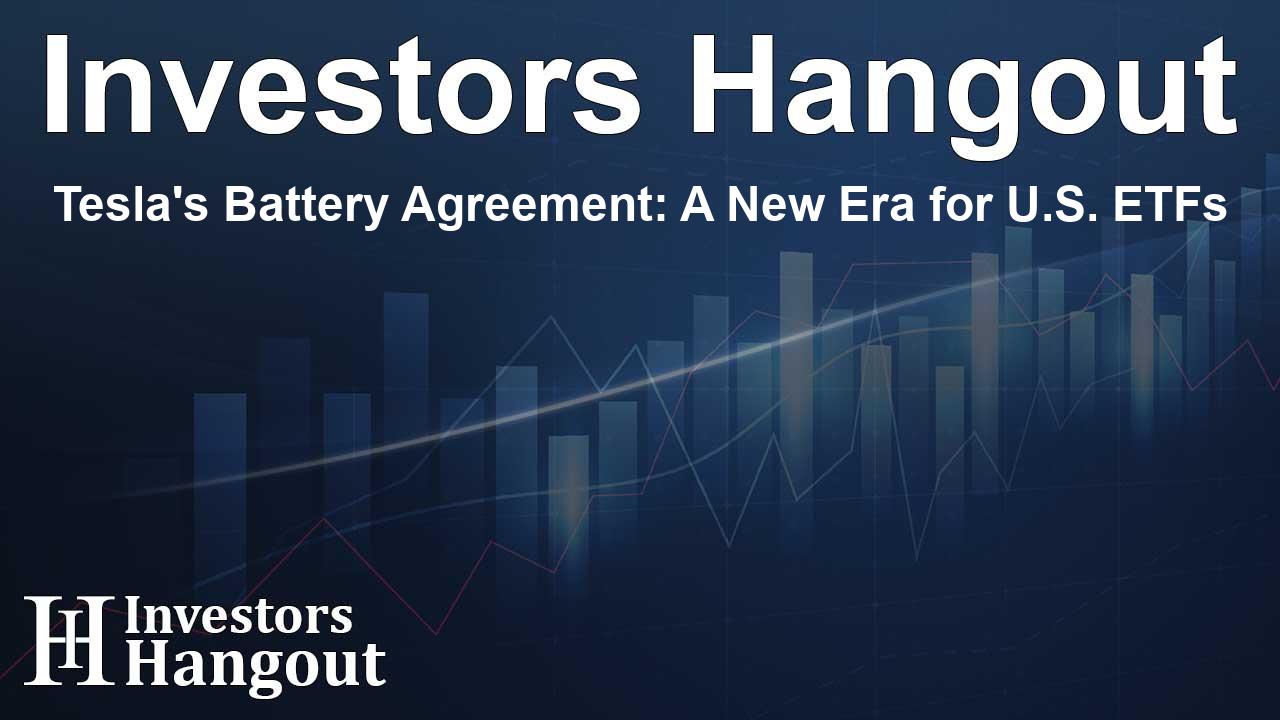Tesla's Battery Agreement: A New Era for U.S. ETFs

The Shift in Battery Production
Tesla Inc.'s TSLA recent $4.3 billion battery agreement with LG Energy Solution exemplifies a significant shift in battery manufacturing dynamics. This move underscores Tesla's commitment to advancing domestic supply chains, aiming to reduce dependence on international suppliers, particularly those based in China.
The Repercussions for ETFs
The new agreement has ramifications for various exchange-traded funds (ETFs) as investors increasingly pivot towards U.S.-based clean energy solutions. As Tesla initiates production of lithium iron phosphate (LFP) batteries in Michigan, it signals a shift away from reliance on major Chinese battery manufacturers like CATL.
U.S. Clean Energy and Manufacturing ETFs
In light of Tesla's strategic pivot, U.S.-focused clean energy and manufacturing ETFs stand to benefit. The emphasis on local production aligns perfectly with ETF sentiments promoting domestic supply chains and manufacturing jobs.
For instance, the iShares U.S. Clean Energy ETF (ICLN) could see heightened inflows as it boasts investments in companies likely to benefit from government incentives designed to promote onshore production. Another ETF worth noting is the First Trust NASDAQ Clean Edge Smart Grid Infrastructure Index Fund (GRID). With Tesla ramping up battery production, related sectors like smart grid infrastructure could emerge as complementary beneficiaries.
Exploiting Global Trends
Paying attention to cross-border dynamics is crucial. South Korean company LG Energy Solution is set to become more prominent as international markets shift due to Tesla's latest moves. ETFs featuring global clean technology may also see an uptick, taking advantage of South Korean advancements in battery manufacturing.
The KraneShares Electric Vehicles and Future Mobility ETF (KARS) is positioned to benefit, as it heavily invests in electric vehicle technologies and is poised to capitalize on the growing recognition of South Korean battery innovation.
Chinese ETFs: Facing Challenges
Conversely, ETFs that have historically depended on China's battery production face potential headwinds. As the momentum shifts towards non-Chinese investment, funds heavily reliant on Chinese battery leaders could be reconsidered by financial analysts and investors alike.
One such example is the KraneShares MSCI China Clean Technology Index ETF (KGRN), which may experience volatility as cash flows directed towards Chinese EV and battery stocks could diminish. Investors seeking stability might pivot towards ETFs focused on diversified or domestic investments.
Understanding the Underlying Trends
This transformation in Tesla's supply chain strategy reflects broader trends in geopolitical dynamics and manufacturing policies. By reducing dependence on foreign suppliers, Tesla not only mitigates risks associated with tariffs and international trade disputes but also capitalizes on favorable domestic policies, including significant tax credits for reshoring production.
As financial leaders forecast this trend, U.S. policy-sensitive ETFs are poised to emerge as winners amid this strategic reorientation towards domestic production.
Investment Outlook
As we navigate this evolving landscape, fund managers and investors must reassess their holdings in light of these developments. Tesla's cutting-edge position in the sector could force a rebalancing of investment strategies, making adaptability prime for success in the next marketplace.
Conclusion
The ongoing forward-thinking initiatives from Tesla, coupled with evolving global dynamics, suggest that fund managers need to stay alert. As the situation unfolds, it becomes evident that the impact reaches beyond quarterly results; proactive measures are essential as the investment landscape shifts dramatically.
Frequently Asked Questions
What is the significance of Tesla's new battery agreement?
Tesla's $4.3 billion battery agreement emphasizes a shift to U.S.-based battery production, reducing reliance on international manufacturers, particularly China.
How will this impact ETFs related to clean energy?
The impact will likely lead to increased interest in U.S.-focused clean energy and manufacturing ETFs like ICLN and GRID, which stand to benefit from domestic production incentives.
What challenges do Chinese-based ETFs face?
Chinese-based ETFs, such as KGRN, may experience reduced investor interest as funding reallocates towards U.S.-based or diversified options.
Why is local battery production important?
Local battery production minimizes risks associated with international trade, including tariffs, while promoting U.S. jobs and technologies.
How can investors adapt to these changes in the market?
Investors should closely monitor their portfolios, anticipating shifts towards domestic investments, especially in ETFs linked to U.S. manufacturing and clean energy advancements.
About The Author
Contact Henry Turner privately here. Or send an email with ATTN: Henry Turner as the subject to contact@investorshangout.com.
About Investors Hangout
Investors Hangout is a leading online stock forum for financial discussion and learning, offering a wide range of free tools and resources. It draws in traders of all levels, who exchange market knowledge, investigate trading tactics, and keep an eye on industry developments in real time. Featuring financial articles, stock message boards, quotes, charts, company profiles, and live news updates. Through cooperative learning and a wealth of informational resources, it helps users from novices creating their first portfolios to experts honing their techniques. Join Investors Hangout today: https://investorshangout.com/
The content of this article is based on factual, publicly available information and does not represent legal, financial, or investment advice. Investors Hangout does not offer financial advice, and the author is not a licensed financial advisor. Consult a qualified advisor before making any financial or investment decisions based on this article. This article should not be considered advice to purchase, sell, or hold any securities or other investments. If any of the material provided here is inaccurate, please contact us for corrections.
